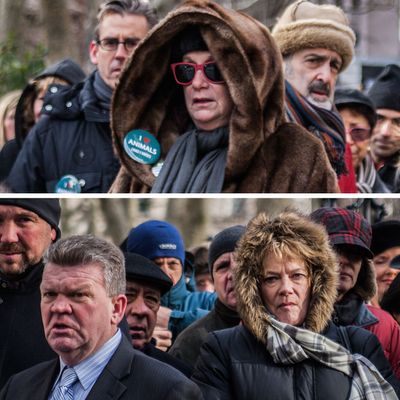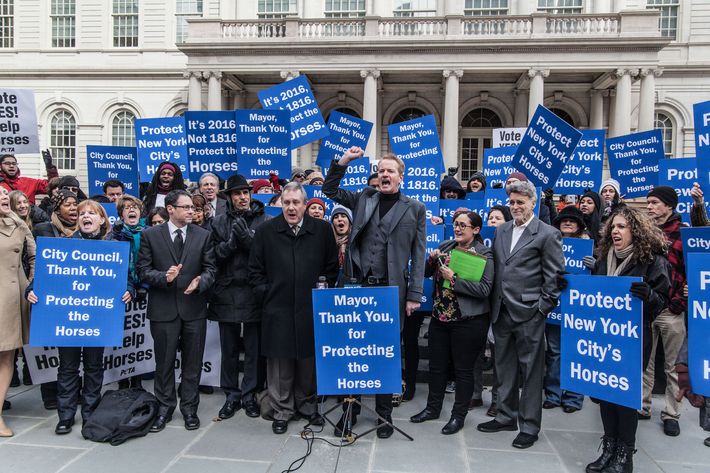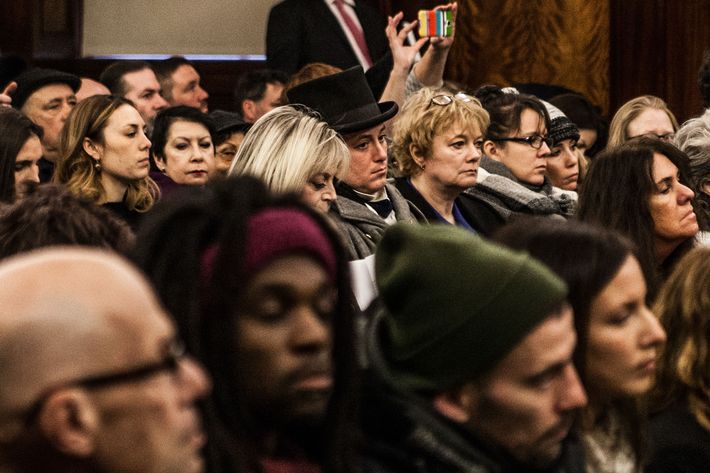
“No clapping, no booing, no rounds of applause,” a City Hall sergeant-at-arms fired back at a crowd that had just interrupted the City Council hearing again. The eruptions weren’t all that surprising, what with a room and upper gallery packed with veteran carriage-horse drivers and animal-rights activists wearing big, round, green NYCLASS buttons.
Friday marked the next stage in the city’s two-year-and-counting battle over carriage-horse policy, with the introduction of proposed legislation to City Council. It’s being billed as a compromise after back-and-forth between the animal-rights groups — and Mayor de Blasio — who say the industry is cruel and want an outright ban, and the carriage-horse drivers themselves, who defend their trade and the treatment of the animals and would be just fine keeping the status quo. Under the new plan, horses would only operate within Central Park with a reduced fleet and a new stable in the park.
“Something that can work for everyone,” said City Councilmember Ydanis Rodríguez about the new bill at the start of the hearing. Except it didn’t always seem that way. The sergeant-at-arms kept collecting dozens of public comment cards, adding and adding to a stack of yellow slips.
The Teamsters, who represent the carriage-horse drivers, agreed to the plan — motivated in part by a desire to avoid a full ban — but are looking for more flexibility, especially when it comes to easing the effects of job losses and implementing the timeline. In the bill’s current iteration, the number of carriage licenses would drop from 180 to 110 by December 2016.
NYCLASS, the major champion of eliminating carriage horses, has also backed the plan. “A good-faith effort,” Allie Taylor, executive director of NYCLASS, called it. “While we would prefer an outright ban — remember, this is 2016, not 1816 — this compromise will help us protect the greatest number of carriage horses right now,” Taylor said. The group, and its supporters, walked out mid-hearing to stage a rally on the steps of City Hall in favor of the new proposal.

And then there are the pedicab drivers, who were thrown into this debate when they found out with the rest of the city that the carriage-horse compromise would relegate them to an area above 85th Street in Central Park. There are nearly 850 pedicab drivers in New York, many of whom make their living picking up fares at the hack stands around Central Park South. Drivers say tourists don’t venture that far north as often, to say nothing of the Harlem Hills. Bahovaddin Hakimov, an seven-year pedicab veteran who’s trying to help organize his colleagues, told Daily Intelligencer these changes will make it really tough for drivers to make a living. Hakimov said they weren’t consulted at all on the plans.

But the proposed Central Park stables might be the knottiest part of the new proposal. The bill has called for a new stable to open in 2018 — to keep the horses completely off the streets. No site is set, though the Parks Department is eyeing a site near the 86th Street Transverse. “[You’re] asking us to vote on something not knowing where the stables will go. They could go on the Great Lawn in theory,” City Councilmember Mark Levine said. There were other problems raised by councilmembers, though: Cost came up; many judged the 2018 timeline to be unrealistic.
Because the audience couldn’t comment aloud, they raised their arms and gave what looked like furious jazz hands of support or dissent. The choreography depended on the point made — pedicab drivers flailed in the upper deck when councilmembers questioned the 85th Street cutoff. The NYCLASS folks bounced on the council floor when councilmembers asked how urgent it was to get the horses off city streets.
“No compromise is perfect,” City Councilmember Daniel Dromm had said at the start of the hearing, a little after 10 a.m. As if to prove his point, the City Council heard the last public comments shortly before 5 p.m.
Yet councilmembers seemed dissatisfied with the plan in its current form, and expressed doubts that the so-called compromise was really a compromise at all. No next steps were announced, but as one council member said, there “are too many questions without answers.”





























